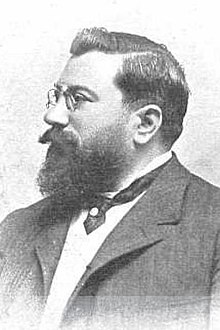| Revision as of 07:57, 16 October 2023 editOnel5969 (talk | contribs)Autopatrolled, Extended confirmed users, Page movers, New page reviewers, Pending changes reviewers, Rollbackers935,744 editsm →top: clean up, added orphan tagTag: AWB← Previous edit | Revision as of 14:52, 16 October 2023 edit undoRandomuserX1 (talk | contribs)196 editsm Not an orphan article anymore as it is now linked at Juan Vázquez de Mella and Traditionalism (Spain).Tag: Visual editNext edit → | ||
| Line 1: | Line 1: | ||
| {{short description|Form of government based on medieval Spain and Portugal}} | {{short description|Form of government based on medieval Spain and Portugal}}], Spanish political thinker portrayed at ''La Ilustració catalana'' (1906)]] | ||
| {{Orphan|date=October 2023}} | |||
| ], Spanish political thinker portrayed at ''La Ilustració catalana'' (1906)]] | |||
| '''Traditional monarchy''' (]: ''Monarquía tradicional'', ]: ''Monarquia tradicional'') is a proposed ] based on the principles of ], ] and ] advocated by various ] traditionalist movements such as ], ] and ].<ref name=":0">{{Cite journal |last=Fernández Riquelme |first=Sergio |year=2009 |title=Del Antiguo Régimen a la Monarquía tradicional. El legado corporativo de Juan Vázquez de Mella. |journal=Arbil. Anotaciones de pensamiento y crítica. |issue=117 |issn=1697-1388}}</ref><ref name=":1">{{Cite journal |last=Dip |first=Ricardo |year=2022 |title=Nótulas sobre o integralismo lusitano |journal=Fuego y Raya |volume=12 |issue=22 |pages=69–82}}</ref> | '''Traditional monarchy''' (]: ''Monarquía tradicional'', ]: ''Monarquia tradicional'') is a proposed ] based on the principles of ], ] and ] advocated by various ] traditionalist movements such as ], ] and ].<ref name=":0">{{Cite journal |last=Fernández Riquelme |first=Sergio |year=2009 |title=Del Antiguo Régimen a la Monarquía tradicional. El legado corporativo de Juan Vázquez de Mella. |journal=Arbil. Anotaciones de pensamiento y crítica. |issue=117 |issn=1697-1388}}</ref><ref name=":1">{{Cite journal |last=Dip |first=Ricardo |year=2022 |title=Nótulas sobre o integralismo lusitano |journal=Fuego y Raya |volume=12 |issue=22 |pages=69–82}}</ref> | ||
Revision as of 14:52, 16 October 2023
Form of government based on medieval Spain and Portugal
Traditional monarchy (Spanish: Monarquía tradicional, Portuguese: Monarquia tradicional) is a proposed political regime based on the principles of Corporatism, Regionalism and Integralism advocated by various Iberian traditionalist movements such as Carlism, Portuguese Integralism and Spanish Integrism.
A traditional monarchy would develop in an active contrast to absolute and constitutional monarchies by rejecting most political changes since the Enlightenment and embracing a medieval conception of politics based on ultramontanism. Defined by its proponent António Sardinha as "catholic, hereditary, organicist, descentralized, representative, based on the historical power of the crown, the political force of municipalities and provinces, and in the expression of the middle bodies of society", the regime would be "based on God and religion, on tradition, on authority, on principles and convictions, and on order".

Traditionalist monarchists rejected the various changes the Spanish and Portuguese governments had undergone during the 19th century and asked for a restoration of an alleged "traditional order" which would have peaked during the Middle Ages and the Portuguese Restoration, before the various liberal state reforms that created modern constitutionalism. Traditionalists proposed the abolition of the modern limited institutions in favour of a system of foralist organic representation and political gelasianism that would be theoretically better adjusted to Iberian traditions and beliefs.
In this context, traditional monarchy would consist of a reivindication of Iberian tradition against intents of "foreignizing" the peninsula. The traditional fueros and religious institutions would be a way of defending Spain against liberal intents of europeizing it and would foster a closer relationship with Portugal and Latin America. Francisco Elías de Tejada considered a modern traditional monarchy as "what the old free order of our peoples would have been" if "the european deviations had not meddled in".
References
- ^ Fernández Riquelme, Sergio (2009). "Del Antiguo Régimen a la Monarquía tradicional. El legado corporativo de Juan Vázquez de Mella". Arbil. Anotaciones de pensamiento y crítica. (117). ISSN 1697-1388.
- ^ Dip, Ricardo (2022). "Nótulas sobre o integralismo lusitano". Fuego y Raya. 12 (22): 69–82.
- Martínez, Gregorio Peces-Barba (2004-08-26). "La monarquía de nuestro tiempo". El País (in Spanish). ISSN 1134-6582. Retrieved 2023-10-15.
- Reis Torgal, Luís (1981). Ideologia política e teoria do Estado na Restauração (in Portuguese). Vol. 1. Coimbra: Biblioteca Geral da Universidade.
- Fernández García, Eusebio (2014). "Tradición y libertades (el 'Manifiesto de los Persas' y sus recuperaciones tradicionalistas)". Revista de Historiografía (20). Universidad Carlos III de Madrid: 139–156.